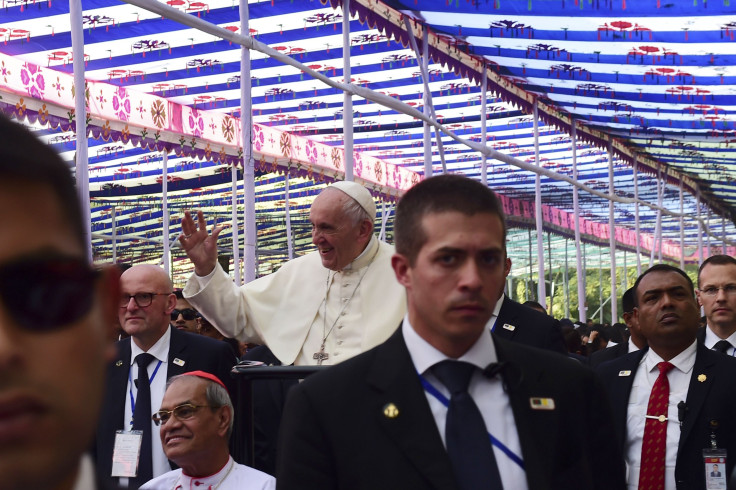In New Year Message, Pope Francis Says 2017 'Ruined' By Injustice, War

Pope Francis capped off 2017 with a speech in which he addressed the global events that occurred around the year, in Vatican City, Sunday.
At the last public event of the year in St. Peter’s Basilica, the supreme pontiff described the year as being plagued by war, lies and injustice while stressing that people should be responsible for their actions, according to a report by Reuters.
The pope said the year was “wasted and wounded” by humans through “works of death, with lies and injustices.” He added although war was the most apparent signal of “unrepentant and absurd pride,” there were numerous other crimes which resulted in “human, social and environmental degradation.”
The pope reportedly said, “Wars are the most flagrant sign of this persistent and absurd pride,” according to a report by teleSUR.
“But so are the small and large offenses against life, against truth, against fraternity, that cause so many forms of human, social and environmental degradation,” he added.
The report stated, regardless of the above, the pope pointed out there was also a display of “gratitude” from the people who “co-operate silently for the common good.”
After the speech, he walked around St. Peter’s Square, shook hands and also clicked pictures with the crowd.
The past year was significant for the pope because of his first papal trip to Myanmar in late November, amidst the torrid period of the Rohingya crisis.
One of the pivotal aspects of the trip was whether the pope would use the highly contested term “Rohingya,” while addressing the humanitarian issue in the country. He apparently also got a request from the archbishop of the Roman Catholic Archdiocese of Yangon, Cardinal Charles Maung Bo, to not utter the word “Rohingya.”
And, the pope did just that. According to a report by the Guardian, he did not mention the persecuted Rohingya minority community while speaking to the crowd during an event in which Myanmar leader Aung San Suu Kyi was also present.

He reportedly said, “The future of Myanmar must be peace, a peace based on respect of the dignity and rights of each member of society, respect for each ethnic group and its identity. … Religious differences need not be a source of division and distrust, but rather a force for unity, forgiveness, tolerance and wise nation-building.”
European Union’s ambassador to Myanmar, Kristian Schmidt, said the pope’s speech was laudable and that he didn’t need to utter the exact words to address the Rohingya crisis.
“He [Pope Francis] didn’t need to. It was written all over the speech, between the lines,” said Schmidt. “It doesn’t have to be about specific words. It was all about values. And on values it was absolutely eloquent and strong.”
The pope’s trip also included a visit to Bangladesh, where 620,000 Rohingya had fled to from Myanmar. According to a report by the New York Times, the pope heard the stories of 16 Rohingya survivors and reportedly said, “We won’t close our hearts or look away. The presence of God today is also called Rohingya.”

He was welcomed by a large gathering of people in Dhaka, the capital of Bangladesh, where he said, “In the name of everyone, of those who have persecuted you, of those who have done you harm, above all for the indifference of the world, I ask forgiveness. Forgiveness.”
The pope addressed the crowd, which included people from different religions; Christians, Hindus, Buddhist and other. While addressing the Rohingya, he said the community was made in the image of God and he promised he would continue to assist them “so that their rights become recognized.”
However, the report also stated the pope did not talk about why he had been so silent on the Rohingya crisis until the visit.
© Copyright IBTimes 2024. All rights reserved.












